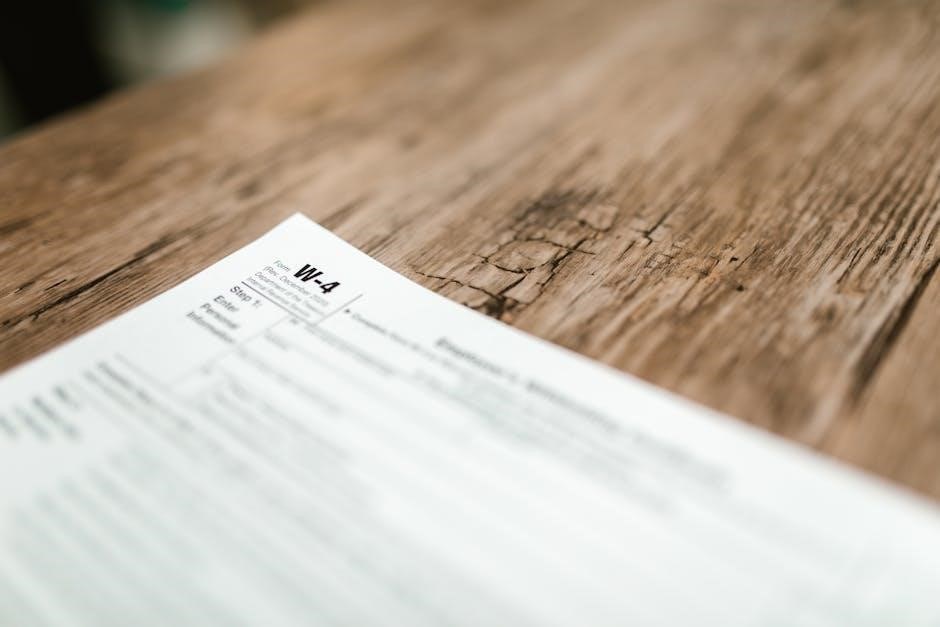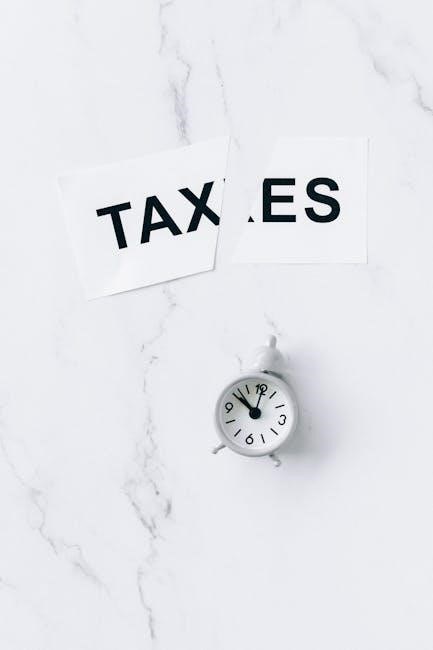A small business tax deductions worksheet is a valuable tool to identify eligible expenses, ensuring accurate calculations and maximizing tax savings. It helps organize deductions like home office expenses, vehicle costs, and advertising, streamlining the filing process and reducing taxable income effectively.
What is a Small Business Tax Deductions Worksheet?
A small business tax deductions worksheet is a tool designed to help business owners identify and calculate eligible tax deductions. It typically includes sections for common expenses like home office deductions, vehicle costs, and advertising. The worksheet guides users through organizing financial data, ensuring accurate reporting on IRS forms such as Schedule C or Form 1120. Available as a downloadable PDF, it simplifies the process of maximizing tax savings and adhering to IRS guidelines.
Benefits of Using a Tax Deductions Worksheet for Small Businesses
Using a tax deductions worksheet offers numerous benefits, including identifying eligible expenses, preventing missed deductions, and improving accuracy. It streamlines the tax preparation process, saving time and reducing errors. The worksheet also helps small businesses stay organized, ensuring compliance with IRS requirements. By simplifying complex tax rules, it enables business owners to maximize savings and confidently prepare for audits or reviews, ultimately enhancing financial efficiency.

Popular Tax Deductions for Small Businesses
Small businesses can claim various tax deductions to reduce taxable income, such as home office expenses, vehicle costs, advertising, travel, and meals.
Home Office Deduction
The home office deduction allows small businesses to deduct expenses for a dedicated workspace, such as a portion of rent, utilities, and insurance. Use IRS Form 8829 to calculate the deduction, which can be based on actual expenses or the simplified option of $5 per square foot. Accurate records are essential to ensure compliance and maximize savings. This deduction is available for both home-based businesses and rented office spaces.
Vehicle and Transportation Expenses
Small businesses can deduct vehicle expenses for business use, such as gas, maintenance, and insurance. The IRS allows using the standard mileage rate or actual expenses. Keep a log to differentiate personal and business use. Parking fees and tolls are also deductible. Accurate records are crucial for compliance. This deduction helps reduce taxable income, providing significant tax savings for businesses reliant on transportation.
Travel and Entertainment Expenses
Small businesses can deduct eligible travel and entertainment expenses, such as flights, hotels, and meals, subject to IRS guidelines. Meals are generally deductible at 50%, except for certain restricted categories. Entertainment expenses must be directly related to business and properly documented. Keeping detailed records is essential to ensure compliance and maximize deductions, helping reduce taxable income and lower overall tax liability for the business.
Meals and Entertainment Deductions
Meals and entertainment expenses can be deducted at 50% if they are business-related and properly documented. Exceptions include meals provided for convenience, certain recreational events, and 100% deductible cases like meals for employees. Entertainment expenses must be directly tied to business activities. Accurate records, including receipts and purpose details, are essential to comply with IRS rules and maximize these deductions, helping reduce taxable income for small businesses.
Advertising and Marketing Expenses
Advertising and marketing expenses are fully deductible as long as they are directly related to your business and properly documented. This includes costs for online ads, social media promotions, print materials, and professional services. Keeping accurate records ensures compliance with IRS guidelines, allowing you to claim these deductions and reduce your taxable income effectively. This is a key area to maximize your tax savings and support business growth.

IRS Forms Relevant to Small Business Tax Deductions
IRS forms like 1040, Schedule C, 1120, 1040-ES, and 1099 are essential for reporting income, claiming deductions, and managing quarterly payments. They ensure compliance and accuracy in tax filings.
IRS Form 1040 and Schedule C
IRS Form 1040 is the standard form for individual income tax returns, while Schedule C is specifically for self-employed individuals and small business owners. Together, they allow businesses to report income, calculate expenses, and claim deductions. Schedule C is attached to Form 1040, enabling small businesses to detail their profit and loss statement. This form is crucial for accurately reporting business activities and ensuring compliance with tax regulations. It also helps in claiming the 20% Qualified Business Income (QBI) deduction for eligible pass-through entities, as outlined in the IRS guidelines for small businesses.
IRS Form 1120 for Corporations
IRS Form 1120 is used by corporations to report income, deductions, and credits. It is distinct from Schedule C, as it applies to C-corporations rather than pass-through entities. The form allows corporations to detail income from various sources, business expenses, and applicable credits, such as the Research Tax Credit. It is essential for calculating the corporation’s tax liability and ensuring compliance with federal tax regulations. Corporations use this form to deduct expenses like salaries, rent, and utilities, reducing taxable income and determining the corporate tax rate.
IRS Form 1040-ES for Quarterly Payments
IRS Form 1040-ES is used by self-employed individuals and small business owners to make quarterly estimated tax payments. It includes a worksheet to calculate payments based on expected income, deductions, and credits. Timely filing ensures compliance and avoids underpayment penalties. This form is essential for managing tax obligations throughout the year, especially for those with variable income sources, helping to spread tax payments evenly and simplify annual filing.
IRS Form 1099 for Independent Contractors
IRS Form 1099 is used to report income paid to independent contractors and non-employees, such as freelancers and consultants, who earn $600 or more annually. Small businesses must issue this form to recipients and file it with the IRS. It helps track payments for tax purposes and ensures compliance with reporting requirements. Accurate completion of Form 1099 is essential for both businesses and contractors to avoid penalties and ensure proper tax deductions are claimed.

20% Qualified Business Income Deduction
The 20% QBI deduction allows eligible small business owners to reduce taxable income by up to 20% of qualified business income, providing significant tax savings for eligible entities.
Understanding the QBI Deduction
The QBI deduction allows eligible small business owners to deduct up to 20% of their qualified business income, reducing taxable income. Eligibility depends on income levels and business type. For joint filers, the limit is $383,900, and for single filers, $191,950. This deduction applies to income from pass-through entities like sole proprietorships, partnerships, and S corporations, offering substantial tax savings. Proper documentation is essential to claim this deduction accurately.
Eligibility Criteria for QBI Deduction
The QBI deduction is available to small business owners with qualified business income from pass-through entities. Eligibility is based on taxable income: up to $191,950 for single filers and $383,900 for joint filers. Deductions are limited to 20% of qualified income or 50% of wages paid, whichever is lower. Businesses must maintain accurate records to verify eligibility and ensure compliance with IRS guidelines for this deduction.

Tracking Expenses for Tax Deductions
Tracking business expenses is crucial for identifying eligible tax deductions. Use tools like spreadsheets or software to record every transaction, ensuring accuracy and compliance with IRS rules.
Importance of Accurate Record-Keeping
Accurate record-keeping is essential for small businesses to ensure compliance with tax laws and maximize deductions. Detailed documentation of expenses, receipts, and transactions helps avoid errors and audits. Using tools like spreadsheets or accounting software can streamline tracking and provide clear financial overviews. Proper records also support deduction claims, ensuring businesses meet IRS requirements and avoid penalties. Consistent and organized tracking fosters financial clarity and confidence during tax season.
Tools for Tracking Business Expenses
Effective tools like spreadsheets, accounting software, and expense-tracking apps help small businesses monitor and categorize expenses accurately. Solutions such as QuickBooks or Expensify automate expense logging, generate reports, and ensure compliance with tax requirements. These tools also integrate with tax preparation software, making it easier to complete worksheets and maximize deductions. Regular use of these resources prevents errors, saves time, and provides a clear financial overview for tax season.

Common Mistakes to Avoid
Common mistakes include overlooking eligible deductions, misclassifying expenses, and failing to maintain accurate records. Avoiding these errors ensures compliance and maximizes tax savings for small businesses effectively.
Overlooking Eligible Deductions
Overlooking eligible deductions is a common mistake that can increase taxable income. Small businesses often miss deductions for home office expenses, vehicle costs, and advertising. Failing to track meal and entertainment expenses or misclassifying travel costs can also lead to missed savings. Using a tax deductions worksheet helps ensure all eligible expenses are accounted for, maximizing tax savings and avoiding costly errors during filing. Accurate record-keeping is essential to prevent oversights and ensure compliance with IRS guidelines.
Incorrect Classification of Expenses
Incorrectly classifying expenses can lead to audits, penalties, and lost deductions. Common errors include mislabeling personal expenses as business-related or categorizing expenses under the wrong tax category. For example, incorrectly classifying home office deductions or vehicle expenses can trigger IRS scrutiny. Using a tax deductions worksheet helps ensure expenses are properly categorized, reducing the risk of errors and ensuring compliance with IRS guidelines for accurate tax reporting. Proper classification is essential for maximizing deductions and avoiding legal issues.

How to Use a Small Business Tax Deductions Worksheet
A small business tax deductions worksheet helps identify and categorize eligible expenses, ensuring accurate tax reporting. List expenses, match them to IRS guidelines, and calculate deductions to maximize savings.
Step-by-Step Guide to Completing the Worksheet
Start by listing all business-related expenses, categorizing them into sections like home office, travel, and advertising. Use IRS guidelines to ensure eligibility. Calculate each deduction accurately, referencing tax forms like Schedule C. Review for completeness and accuracy to avoid errors. Finally, ensure compliance with IRS rules to maximize tax savings and prevent audits. This structured approach simplifies the process and ensures no eligible deductions are missed.
Maximizing Your Tax Savings
To maximize tax savings, identify all eligible deductions using a small business tax deductions worksheet. Organize expenses like home office costs, vehicle use, and advertising. Ensure accuracy by referencing IRS guidelines and forms like Schedule C. Regularly update financial records to avoid missed deductions. Stay informed about tax law changes and utilize tools like the IRS Tax Guide for Small Businesses to optimize savings and reduce taxable income effectively.
Understanding small business tax deductions is crucial for minimizing taxable income and maximizing savings. Use a deductions worksheet to organize expenses and ensure compliance with IRS guidelines, optimizing your financial strategy effectively.
Final Tips for Maximizing Tax Deductions
To maximize tax deductions, small businesses should maintain precise records, leverage tax software, and consult professionals. Regularly review IRS guidelines to ensure compliance and identify new deduction opportunities. Staying organized and proactive can significantly reduce taxable income and boost financial health.
Utilize a tax deductions worksheet to systematically track expenses, ensuring no eligible deduction is overlooked. This tool simplifies the process, helping businesses reclaim costs like home office expenses, travel, and advertising, ultimately optimizing tax savings and streamlining filing.
Staying Informed About Tax Changes
Small businesses must stay updated on tax law changes to maximize deductions and maintain compliance. Regularly visit the IRS website for updates, subscribe to tax newsletters, and consult with professionals. Utilize tax software that automatically updates with new regulations. Proactive monitoring ensures businesses can quickly adapt to changes, such as new deduction opportunities or revised reporting requirements, keeping their financial strategies aligned with current tax codes.